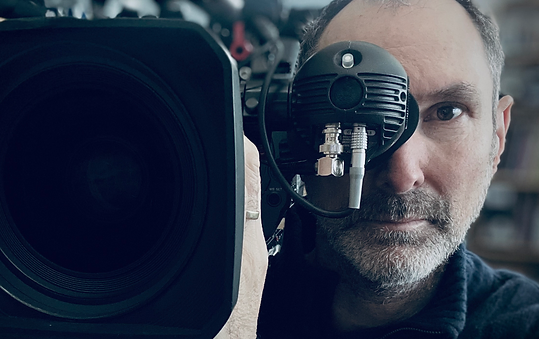 “With Peter Bradley” is an intimate portrait of 82-year old Black abstract painter Peter Bradley, who as a young artist, art dealer and curator rose to remarkable heights in the 1960s and ‘70s, before slipping gradually into obscurity beginning the 1980’s. Screening at the Florida Film Festival, this documentary is a fascinating and well made look at an artist’s process as well as his past accomplishments and current place in art history, and in this interview I ask cinematographer turned first time feature length filmmaker Alex Rappoport about his process in putting this all together, the film’s incredible jazz score, and his future ambitions.
“With Peter Bradley” is an intimate portrait of 82-year old Black abstract painter Peter Bradley, who as a young artist, art dealer and curator rose to remarkable heights in the 1960s and ‘70s, before slipping gradually into obscurity beginning the 1980’s. Screening at the Florida Film Festival, this documentary is a fascinating and well made look at an artist’s process as well as his past accomplishments and current place in art history, and in this interview I ask cinematographer turned first time feature length filmmaker Alex Rappoport about his process in putting this all together, the film’s incredible jazz score, and his future ambitions.
Chris Crespo: Your production notes state you had over 20 hours of footage when you decided to start editing, so how did you manage to cut that down to a 90-minute feature? How did the overall story and feel of the documentary reveal itself to you as you assembled the film?
Alex Rappoport: I had 20 hours recorded when the Covid shutdown started in March 2020. So I did technically start editing at that point, but it was mostly organizational and a way to keep myself sane during those awful and scary weeks. We started filming again the first week of May I think, and then I shot frequently with Peter until the end of June before really sitting down to edit in earnest. At that point I had maybe 50 hours of material. And then I picked up interviews and little bits of Peter painting in the Fall, after I had a sense of what gaps needed to be filled narratively/biographically.
Editing is always a process of elimination and in this case took a year and a half of effort to get the film down to essentially where it ended up. There were many entertaining anecdotes/sidebars that Peter talked about but at a certain point I needed to pare down all the storytelling to make more room for his painting process, which is originally what I thought the film would center on. It wasn’t until I realized how varied and important the biography was that I started to seek a balance between the two elements. Essentially my tactic was to intersperse the biography with process scenes and hope that it resulted in a satisfying experience for viewers. In other words, there is no “story” per se; nothing happens over the time I spent with Peter; there is no dramatic arc – just the story of his life, which is not without some drama itself, as it turns out. The hardest editorial task was figuring out how to create the sense of an ending to the film. I focused on Peter’s comments about aging, memory loss, and sentimental thoughts about his mother in sequence to elicit an emotional resonance. Hopefully that works.
CC: The original jazz score by Javon Jackson feels like the film’s secret weapon, as it plays so well with Peter’s process and artwork; at what point in the process did you get this score and how much did it play into your editing?
AR: The score is amazing and was composed after the film was edited. Javon is an old friend of Peter’s, so he knew exactly the kind of music Peter likes to listen to – the canon of mid-20thC modern jazz. Throughout the editing process I used an amazing array of music off of Peter’s CDs – Miles Davis, John Coltrane, Art Blakey… on and on. It was incredible but there was no way I could have afforded to license those tracks! So Javon heard the styles I had picked to cover certain scenes and then did a great job of internalizing those and composing the tailor-made cues in the finished film. The score was recorded live by Javon’s quintet and I took all those recordings and then tweaked the picture wherever the timings needed some adjustment to be just right.. He’s just made a soundtrack album, by the way, which should be available very soon on Spotify and other platforms. I hope to be able to sell copies of the CD at film festivals too – and might even have some in Florida.
CC: Why do you think Peter’s career and achievements had been overlooked and seemingly forgotten for so long? It seems simply moving to upstate New York shouldn’t be enough to erase several decades of phenomenal work and yet when you met him in 2020 he was clearly struggling to get by.
AR: The question of Peter’s fall from success is a complex one to answer – and I’m certainly not the definitive expert! That said, it seems to me that there were layers of factors. First and foremost, race was clearly an issue for him, as it was for most Black artists and other professionals at the time. And it’s touched on lightly in the film, but color field painting in general went out of fashion by the 1980s, so it was hard for a lot of those abstract artists – black, white, green or gray, as Peter says – to sell work. The stint of Peter’s drug use certainly didn’t help with the whole situation, and to some extent one gets the sense that Peter could also have the ability to be his own worst enemy – his pride and strong opinions I’m sure put plenty of people off, and given his lack of tolerance for BS, he probably burned some professional bridges along the way. What’s remarkable and so appealing about Peter – at least at the age of 80 – is that he really isn’t looking to point his finger at anyone; isn’t a bitter old man. He just got on with his life and art as best he could. And now it’s paid off big time! Peter’s work is selling for hundreds of thousands of dollars in some cases. Its an uncanny turn of events that began basically just after I stopped filming him. Crazy. I’m so happy for him.
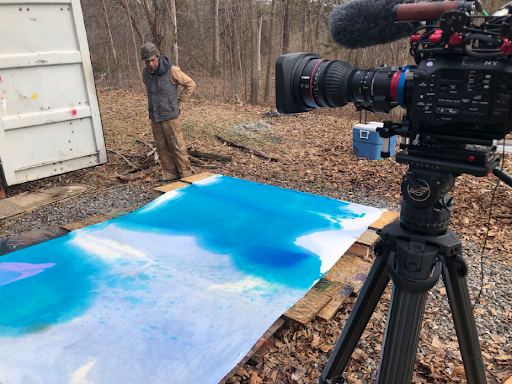 CC: You’ve been working for a while as a cinematographer but this is your first film as a director. Do you see yourself exploring other topics in feature length form as a director, or is this a one off project that came about simply because of your proximity to the subject?
CC: You’ve been working for a while as a cinematographer but this is your first film as a director. Do you see yourself exploring other topics in feature length form as a director, or is this a one off project that came about simply because of your proximity to the subject?
AR: That’s a good question. I’d love to make more films of my own, but I have to be honest with you – the landscape for independent documentaries that aren’t about crime, cults or other sensational or celebrity-driven stories is really bleak right now. Thankfully making this film didn’t require me to make a huge investment because I’ll be lucky if I ultimately make a nickel for it. There’s no doubt that this project was special in that Peter and I are essentially neighbors and it was a very convenient labor of love on my part. Hopefully someone will see the work I did and give me the opportunity to do it again.
Chris Crespo is a movie critic, writer and podcaster based out of Orlando, Florida. He hosts the weekly podcast Cinema Crespodiso, and has also made appearances on Doug Loves Movies, A Mediocre Time with Tom and Dan, The Curtis Earth Show, and more. This is his 13th year covering the Florida Film Festival.
This interview was conducted via email.

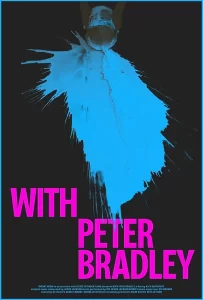
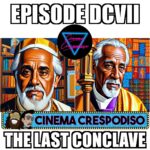 #607 – The Last Conclave
#607 – The Last Conclave Review: ‘Big Eyes’
Review: ‘Big Eyes’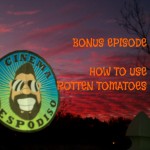 Bonus Episode – How to use Rotten Tomatoes
Bonus Episode – How to use Rotten Tomatoes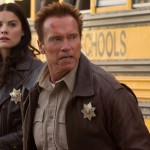 Review: ‘The Last Stand’
Review: ‘The Last Stand’
Leave a Reply
You must be logged in to post a comment.